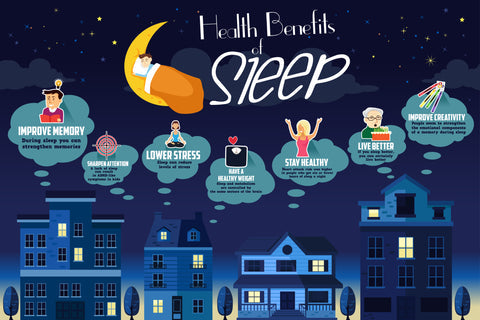What if it turned out to be more accurate to state: “Nighttime sleep keeps the doctor away,” than it is, “An apple a day keeps the doctor away”?
Sleep is truly a pillar for health. You absolutely can’t have optimal health without it.
Yet getting enough sleep is a problem many people struggle with, due to medical disorders such as sleep apnea, work schedules/shift work, noise and light pollution, poor sleep hygiene, or just a go-go 24/7 lifestyle.
Good sleep just makes you feel better overall during your waking hours. Sleep benefits many parts of your life. It supports you in many ways to:
- Perform better
- Feel more energetic & healthier
- Look better, be thinner
- Have more mental clarity
- Enjoy a more positive mood
Short Term Brain Fog and More
Sleep problems can lead to short-term problems such as grogginess, brain fog, bad mood, and short-term memory problems. And it doesn’t take much of an imagination to think what happens when you’re groggy behind the wheel…
Sleep Deprivation’s Nasty Long-Term Effects
Insufficient sleep can also lead to many long-term chronic health issues – including heart disease and stroke, high blood pressure, dementia/Alzheimer’s, type 2 diabetes, and many types of cancer.
Multiple PubMed articles show a clear link between sleep deprivation and incidence of type 2 diabetes, which has become a global epidemic.
Sleep restriction has been consistently shown to increase hunger, appetite and food intake, with the increase in caloric intake more than offsetting the added energy requirements of extended wakefulness. If you want to lose weight, don’t ignore your seven to eight hours every night.
Many epidemiological studies have uncovered elevated rates of chronic disease with sleep insufficiency – including cancer, type 2 diabetes, heart disease, obesity, mood disorders, and age-related macular degeneration.
Mary Jane Frye, Oklahoma City integrative pharmacist, suggests, you should get screened for any underlying health issues that may be the root cause of your sleep issues. Especially if the following list of practical lifestyle steps doesn’t resolve your sleep issues.
Taking five minutes to read this article could be lifesaving.
13 Ways to Sleep Better Every Night
1. Shortly before sunset, dim the lights and your screens. Turn off overhead lights and use table lamps with low-light bulbs instead.
2. Avoid all blue light (such as computer screens and TVs) exposure after sunset. Blue light at night suppresses melatonin release and can greatly impair sleep (even if you don’t believe it does).
3. Take a hot bath, sauna, or use a hot tub in the evening. It warms you up, leading to a rapid cool-off in body temperature, which aids sleep.
4. Avoid alcohol in the evening. Yes, it may make you sleepy, but then it wakes you up during the night and gives you disrupted sleep.
5. If you live where there’s light pollution (most of us do), use light-blocking blackout shades to keep light out of your bedroom. Remove all other sources of light from your bedroom, including digital alarm clocks and cell phones.
6. Never sleep with your cell phone under your pillow, or plugged in on your nightstand. Turn your cell phone onto airplane mode at night.
7. Avoid eating within two to three hours of bedtime, especially heavy meals.
8. Avoid late-day exercise. It can impair your ability to sleep. You’re rousing yourself up at a time of day when you should be winding down.
9. According to James B. Maas, PhD and author of the book Power Sleep, any noise louder than a dripping faucet can interfere with sleep. If you can’t stop the noise (for instance, traffic), you still have options…
Furnish your bedroom with heavy drapes and thick carpeting. If you build a house, ensure the bedroom walls and ceilings have plenty of insulation.
Other potential sound barriers include a white noise machine or sound-blocking earplugs.
10. Keep your bedroom cool. Too warm, and your wake-up cortisol levels rise in the middle of the night instead of when it’s time to get up. Scientists recommend 65 degrees.
11. Buy the best mattress you can afford. Choose one you can test-drive for 30 to 90 days with a decent return policy. If you sleep with someone else, make sure you both agree on the qualities your mattress should have. Rotate your mattress regularly – about once a month… and flip it also.
12. Choose quality bedding. Opt for cotton, preferably organic. Or silk or linen. They feel smooth against the skin and absorb moisture better than synthetics. Sheets with the highest thread counts are generally softest. And they sleep cooler than synthetics.
13. Try a quarter or half scoop of Brain and Sleep Support, Endolyft, in the evening. Small amounts have helped many people get a much better night’s sleep. You can also try taking magnesium at bedtime or shortly before.
Do These Things in the Morning for Better Sleep at Night…
1. Get outside at sunrise for 10 minutes or more… the cloudier it is, the longer it takes. Look towards – but not directly at – the sun. It helps set your circadian rhythm for the day, making you more ready to sleep that night. If possible, combine it with an outdoor workout.
2. Exercise first thing in the morning. It helps raise your core body temp and makes you feel more alert during the day.
3. Limit your caffeine to morning hours, and to two cups of coffee or six cups of tea per day. Cut off your caffeine consumption by noon or 2:00.
4. Get plenty of exercise and movement throughout the day. If you sit all day long, you’ll be more inclined to want to move late in the day.
5. Eat a healthy, wholesome diet. Junk food and fast food don’t do anything to enhance sleep.
6. Drink plenty of water during the morning and early afternoon, so you can limit your consumption later in the day. It’ll aid your ability to sleep throughout the night.

FAQs
What are the health risks of sleep deprivation?
Chronic sleep deprivation increases the risk of obesity, heart disease, type 2 diabetes, depression, impaired immunity, and cognitive decline. It also affects mood, decision-making, and reaction time.
What are the short-term effects of sleep deprivation?
Short-term sleep deprivation can cause irritability, poor concentration, memory lapses, slow reaction times, brain fog, and weakened immunity. Even one night of poor sleep can impair decision-making and elevate stress hormones.
Is sleep deprivation a risk factor for heart disease and cancer?
Yes, chronic sleep deprivation increases the risk of heart disease, high blood pressure, and may contribute to cancer development by disrupting immune function, elevating inflammation, and impairing DNA repair.
How many hours of sleep do adults need to avoid health problems?
Most adults need 7 to 9 hours of quality sleep each night to maintain healthy brain function, hormone balance, metabolism, and immune health. Regularly sleeping less than 6 hours or having disrupted sleep is associated with an increased risk of chronic disease.
Is disrupted sleep as bad as too few hours of sleep?
Yes, disrupted sleep can be just as harmful as too little sleep—sometimes even worse. Frequent awakenings prevent the brain from completing full sleep cycles, especially deep and REM stages, which are critical for memory, hormone balance, and cellular repair.
Even if you spend 8 hours in bed, fragmented sleep can leave you feeling just as exhausted, foggy, and metabolically stressed as getting only 4–5 hours of sleep.





Share:
The Answer to Addictions Hardly Anyone Knows About
Hormones Driving You Crazy? How to Stop Them.